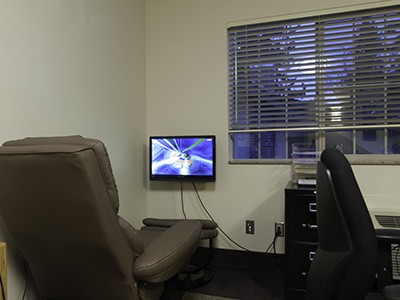Neurofeedback
WHAT IS NEUROFEEDBACK?
Neurofeedback is a type of biofeedback that uses a real-time display to monitor brain activity. This information is given back to the brain and allows the brain to regulate the nervous system at a more optimal level. Optimizing the functioning of the brain, and thus the nervous system, has many positive effects.
HOW IS NEUROFEEDBACK PERFORMED?
Neurofeedback is a passive and painless process. Three electrodes are placed on the scalp using rubbing alcohol and electrode paste. The electrodes are passive and do not put anything into the brain, but measure the electrical output of the brain. During training, a movie or game is played through neurofeedback software. When the brain is operating at an optimal level, the picture on the screen is big and clear. If the brain moves out of optimal functioning, the picture shrinks and may become cloudy. The brain makes adjustments on a subconscious level that allow regulation back to optimal functioning. The longer the amount of time the brain spends functioning in and out of this optimal range, the more flexible and resilient the nervous system becomes.
WHAT DOES NEUROFEEDBACK HELP?
Neurofeedback helps a wide variety of things that challenge people every day because every system in the body is regulated using the nervous system. Research shows neurofeedback helping with:
- Addictive Behaviors
- Aggressive Behavior
- Anorexia
- Attachment Problems
- Bulimia
- Compulsive Behavior
- Constipation
- Despair
- Dissociative Episodes
- Emotional Expression
- Emotional Overwhelm
- Fybroidmyalgia
- Hyper-vigilance
- Irritability
- Lacking Boundaries
- Mood Swings
- Nightmares
- Obsessive Thoughts
- Panic Attacks
- Perfectionism
- Physical Tension
- Seizures
- Self-Injurious Behavior
- Short-Term Memory
- Stomachaches
- Trauma
- Vertigo
- Working Memory
- Agitation
- Anger and Rage
- Anxiety
- Body Tension
- Chronic Fatigue
- Conflict
- Depression
- Difficulty Sleeping
- Early Trauma
- Emotionally Reactive
- Fear and Anger
- Headaches/Migraines
- Impulsivity
- Irritable Bowel
- Mental Calming
- Motivation
- Night Terrors
- Obsessive Worry
- Paranoia
Phobias - Poor Concentration
- Self-Esteem
- Sexual Concerns
- Sleep Walking
- Suicidal Thoughts
- Verbal Expression
- Withdrawn


